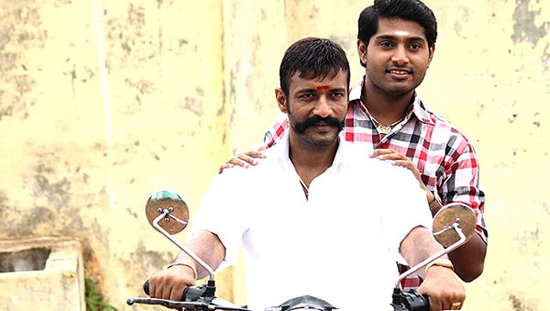Thilakar
Director: Perumal Pillai
Cast: Kishore, Dhruva, Mrudhula Bhasker, P Ramu
Rating: 2.5/5
The swing of the sickle is back in Tamil cinema after a brief but welcome hiatus, and we see plenty of blood and gore in Perumal Pillai’s first film, Thilakar. Based on a true story (at least this is what the credits claim), the plot unfolds in the rural hinterland of Thirunelveli in Tamil Nadu — a rustic location costumed by veshti-clad men riding motorcycles with a breeze and sporting sickles with a song.
And these are some of the favourite things with Tamil writers and directors, who believe that most of their ticket-paying audiences live away from urban conglomerations. And for these men and women, nothing can be more exhilarating than seeing their popular stars in a veshti or a half-sari.
If the sickle is hardly a new thing in Tamil movies, feuding families aren’t either, and this is something we have been watching on the Indian screen for decades. There have been so many Indian versions of Capulets and Montagues since Shakespeare first wrote Romeo and Juliet in the late 16th century that one has lost count of them.
So, we have in Thilakar, an Ukira Pandian (P Ramu), an ageing village patriarch, whose ego has been exploding with age, and he cannot stand the sight of a much younger and soon-to-be-father, Bose Pandian (Kishore), the head of a ‘rival’ family.
Bose of course is far more enlightened, and is keen on educating his younger brother, Thilakar (Dhruva), and seeing his other sibling join the police force. Bose wants to end this meaningless conflict, but hot-blooded men would let the earth turn red rather than sow seeds of harmony on it. Unfortunately, Thilakar cannot complete his education, and is forced to transform from a peaceful guy into an epitome of violence and vindictiveness.
Yes, Thilakar is not entirely Shakespearean. We really do not have a love story there, and a budding romance between Jay (Mrudhula Bhasker) and Thilakar is nipped in the bud — when she walks out on him saying that she has no inclination for a life lived amidst death and destruction.
If this variation is a wonderful relief, debutant Dhruva is marvellous as a man who is forced by unsavoury circumstance to become a monster. The shift is realistically portrayed. The two other actors, Ramu — essaying the silent but sinister villain of the drama — and Kishore as the man desperate to broker peace — lift an otherwise beaten-to-death subject to the higher echelons of cinema.

